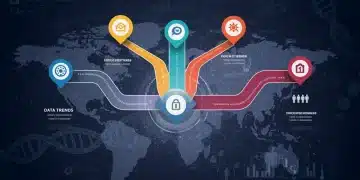Pragmatic ESG business school curriculum shift: why it matters

Pragmatic ESG business school curriculum shifts prepare future leaders by integrating environmental, social, and governance principles into education, fostering critical skills and a commitment to sustainability.
Pragmatic ESG business school curriculum shift is reshaping the future of business education. Have you ever wondered how sustainability principles can be woven into traditional business practices? Let’s dive into this transformative approach.
understanding ESG principles in education
Understanding ESG principles in education is crucial for shaping responsible business leaders. These principles focus on environmental, social, and governance factors, which are integral to creating sustainable corporate strategies. By integrating these concepts into the curriculum, schools can prepare students for the challenges of the modern business world.
Environmental awareness forms the foundation of ESG education. Knowing how businesses impact the planet is essential. Companies today face a growing demand for transparency in their environmental practices. Students are taught to evaluate resources and minimize waste. Incorporating real-world examples helps illustrate the importance of sustainable practices.
Key Learning Objectives
Understanding ESG includes several learning goals:
- Recognizing the impact of business decisions on the environment.
- Understanding social responsibility and its relevance in business.
- Examining governance structures and ethical practices in companies.
On the social aspect, students explore how businesses can positively affect communities. They learn about corporate social responsibility and the role of ethical leadership in promoting inclusivity. Discussions around diversity, equity, and community engagement are crucial.
Incorporating Governance
Finally, governance emphasizes the systems and processes that ensure accountability in businesses. Understanding these frameworks prepares students to make informed decisions and advocate for ethical practices in their future careers.
The integration of ESG concepts into education not only benefits students but also fosters a new generation of leaders committed to making a positive impact. Through a comprehensive approach, educational institutions can create curricula that reflect the urgency of sustainability and social responsibility.
the importance of pragmatic approaches
The importance of pragmatic approaches in education cannot be overstated, particularly when discussing the integration of ESG principles into business school curricula. By embracing a practical and realistic mindset, educators can create effective learning environments that resonate with students’ real-world experiences.
Pragmatic approaches focus on what works effectively in practice rather than sticking solely to theoretical concepts. This method helps students understand how to apply theory to real-life situations. For instance, rather than just learning about ESG principles in abstract terms, they engage in activities that allow them to explore these concepts directly.
Benefits of Pragmatic Approaches
Adopting pragmatic strategies in education offers several distinct advantages:
- Encourages active participation from students.
- Enhances critical thinking and problem-solving skills.
- Facilitates the application of knowledge to real-world issues.
When students are involved in hands-on projects, for example, they can see firsthand the impact of decisions on the environment and society. This connection bridges the gap between theory and practice, fostering deeper understanding. A pragmatic approach also prepares students for the complexities of modern business landscapes, where ethical and sustainable practices are paramount.
Real-World Applications
Integrating real-world scenarios into the curriculum allows students to learn through examples. Case studies of companies that have successfully implemented ESG strategies can inspire students and help them envision their paths in the business world. They can learn how businesses adapt to regulatory changes and societal expectations.
In conclusion, embracing pragmatic methods not only enriches educational content but also equips students with the necessary tools to navigate the complexities of today’s business environment.
real-world case studies of successful ESG shifts

Real-world case studies of successful ESG shifts provide valuable insights into how businesses integrate environmental, social, and governance principles effectively. Learning from these examples can inspire future leaders to adopt sustainable practices in their own careers.
One notable case is that of Unilever. The company has made significant strides in sustainability by committing to reducing its environmental footprint. They focus on responsible sourcing and aim to improve health and well-being for millions of people. By implementing these changes, Unilever has not only contributed positively to the planet but also enhanced its brand reputation and customer loyalty.
Key Features of Successful ESG Shifts
Successful ESG transformations often share common characteristics:
- Clear commitment from leadership to implement ESG strategies.
- Engagement with stakeholders to understand their needs.
- Measurable goals to track progress over time.
Another compelling example is Patagonia, known for its commitment to environmental activism and sustainable practices. They donate a percentage of sales to environmental causes and emphasize **transparency** in their supply chain. Patagonia’s dedication to ESG principles resonates with consumers who value corporate responsibility, setting a benchmark for the industry.
Impact of ESG Shift on Business Success
These case studies demonstrate that a well-executed ESG shift can lead to increased operational efficiency, reduced risks, and better financial performance. For instance, companies that prioritize sustainability often attract talent who prefer working for socially responsible employers. Furthermore, these businesses are often more resilient in changing markets.
By analyzing such case studies, students and professionals can draw valuable lessons on implementing ESG principles effectively. They illustrate not just the importance of sustainability, but also how it can lead to lasting success in the competitive business landscape.
how students benefit from ESG-focused learning
How students benefit from ESG-focused learning is a critical topic in modern education. By engaging with environmental, social, and governance principles, students acquire skills that are essential for their futures. This approach encourages not only academic growth but also personal development.
ESG-focused learning fosters critical thinking, allowing students to analyze complex issues. They learn to identify the implications of business decisions on society and the environment. This understanding positions them as responsible future leaders.
Skills Developed through ESG Education
Students gain numerous skills through their ESG-oriented curriculum:
- Problem-solving: They navigate real-world challenges, finding sustainable solutions.
- Collaboration: Many projects involve teamwork where diverse perspectives come together.
- Communication: Presenting their findings enhances their ability to articulate ideas effectively.
In addition to skills, students also develop a sense of purpose. They become aware of global challenges and their roles in addressing them. For instance, projects that focus on sustainability empower them to think globally while acting locally. They see that their actions can lead to positive change in their communities.
Building a Sustainable Mindset
Furthermore, ESG-focused learning nurtures a sustainable mindset. Students learn the importance of ethical decision-making and corporate responsibility. This education inspires them to pursue careers in fields that align with their values.
The benefits of ESG-focused learning extend beyond the classroom. As these students graduate, they carry with them a deep understanding of the importance of sustainability and social responsibility. This knowledge differentiates them in the workforce, making them sought-after candidates.
future trends in business education and ESG
Future trends in business education and ESG principles are shaping how institutions prepare students for tomorrow’s challenges. As sustainability becomes a central focus across industries, educational programs are evolving to meet these new demands.
Incorporating ESG into curriculums is no longer optional; it is essential. Business schools are now prioritizing sustainable practices to equip students with the necessary skills to navigate complex global issues. This shift emphasizes a holistic approach to education, merging traditional business knowledge with sustainability.
Emerging Areas of Focus
Several notable trends are emerging in business education related to ESG:
- Integration of Technology: Educational institutions are leveraging technology to enhance learning experiences. Online courses provide flexible options for students to learn about ESG principles.
- Interdisciplinary Approaches: Collaboration between different fields of study helps students see the broader impact of business on society. This includes partnerships with environmental science, social studies, and public policy.
- Real-World Application: Experiential learning opportunities, such as internships and projects with companies focused on sustainability, are becoming more common.
As students engage with these trends, they develop a practical understanding of how to implement ESG strategies. This prepares them for the evolving job market where companies seek professionals who are not only business-savvy but also committed to ethical practices. They learn to analyze data related to sustainability and understand its implications for decision-making.
Emphasis on Lifelong Learning
Moreover, the emphasis on lifelong learning is significant. The business world is rapidly changing, and continuous education will be crucial for staying relevant. Professionals will need to adapt their knowledge of ESG practices as regulations and societal expectations evolve.
With these future trends in mind, business education will continue to transform, placing greater emphasis on sustainability and ethical practices in shaping responsible leaders for the future.
FAQ – Frequently Asked Questions about ESG in Business Education
What are ESG principles in business education?
ESG principles focus on environmental, social, and governance factors, guiding businesses to operate responsibly and sustainably.
How do students benefit from ESG-focused learning?
Students enhance skills like critical thinking and collaboration while understanding the impact of business decisions on society and the environment.
What trends are shaping the future of business education?
Key trends include technology integration, interdisciplinary approaches, and a strong emphasis on lifelong learning to adapt to changing markets.
Why is a pragmatic approach important in ESG education?
A pragmatic approach makes learning more relevant by applying real-world scenarios, helping students connect theoretical knowledge to practical challenges.





